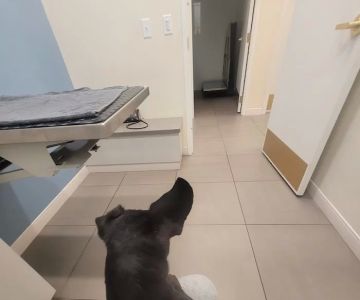Can You Get a Master's in Veterinary Medicine? Everything You Need to Know
As a passionate animal lover, have you ever wondered about pursuing an advanced degree in veterinary medicine? Perhaps you're already familiar with the essential path to becoming a veterinarian—completing a Doctor of Veterinary Medicine (DVM) program. But what if you are interested in an advanced degree in veterinary science? Can you get a master's in veterinary medicine? Let's explore the options, requirements, and career opportunities that come with this pursuit.
1. What is a Master's in Veterinary Medicine?
Unlike the DVM, which is a professional degree required to practice as a veterinarian, a master's in veterinary medicine typically focuses more on research, advanced clinical practices, or specialization in specific areas of animal care. Some students choose this path if they are interested in veterinary public health, animal nutrition, or even veterinary pathology. It’s also a great fit for those looking to teach or conduct research in veterinary sciences.
2. Master's in Veterinary Science vs. DVM
Many people confuse a master's in veterinary medicine with the DVM. However, the two serve different purposes:
- DVM (Doctor of Veterinary Medicine): This is the professional degree required to become a licensed veterinarian. It’s a rigorous program that requires a pre-veterinary undergraduate education followed by a 4-year veterinary school program.
- Master's in Veterinary Medicine: This is an advanced degree that can be pursued after obtaining a bachelor’s degree or sometimes even a DVM. It’s typically focused on specialization, research, or a specific area of veterinary science. Unlike the DVM, it doesn’t necessarily lead to becoming a practicing veterinarian.
3. Why Pursue a Master's in Veterinary Medicine?
While the path to becoming a veterinarian is well-defined, pursuing a master's in veterinary medicine offers several benefits:
- Specialization: You can choose to specialize in a specific area of veterinary medicine, such as wildlife conservation, veterinary public health, or laboratory animal medicine.
- Research Opportunities: If you have a passion for research, this degree opens doors to opportunities in animal health research, vaccine development, or studying the epidemiology of animal diseases.
- Academic Careers: If you're interested in teaching, a master's degree can also be a stepping stone toward a career in academia.
- Broader Career Paths: Many graduates of master's programs in veterinary medicine go on to work in government agencies, research institutions, or private industry, applying their expertise in areas such as food safety or biotechnology.
4. Requirements for a Master's in Veterinary Medicine
To apply for a master's in veterinary medicine, certain prerequisites must be met. While the requirements can vary depending on the program, here are the general steps:
- Undergraduate Degree: A bachelor's degree in animal science, biology, or a related field is typically required for admission. Some programs may also accept applicants with degrees in other sciences.
- Relevant Experience: Practical experience in a veterinary setting, whether through internships, volunteer work, or research assistantships, is highly valued by admissions committees.
- Research Proposal (if applicable): In some programs, you may be asked to submit a research proposal or outline your areas of interest for further study in veterinary medicine.
- Graduate Record Examinations (GRE): Some programs may require GRE scores, although this requirement is becoming less common.
5. Career Opportunities with a Master's in Veterinary Medicine
While a master's in veterinary medicine doesn’t qualify you to practice as a veterinarian, it can open the door to a variety of exciting career opportunities:
- Veterinary Researcher: Many graduates work as researchers in veterinary science, contributing to studies on animal diseases, treatments, and health innovations.
- Veterinary Public Health Specialist: These professionals work to ensure public health by managing the spread of diseases from animals to humans (zoonoses).
- Animal Health Product Development: Graduates may find work with pharmaceutical companies, helping to develop and test medications, vaccines, or other veterinary health products.
- Educator: Some graduates go on to teach veterinary medicine or animal sciences at universities or colleges.
6. Top Programs for Master's in Veterinary Medicine
Several universities across the United States offer strong programs for students pursuing a master's in veterinary medicine. Here are some top choices:
- University of California, Davis: Known for its comprehensive veterinary programs, UC Davis offers research-focused opportunities for graduate students.
- Cornell University: Cornell’s College of Veterinary Medicine provides a wide range of research and specialized programs, making it a leader in the field.
- University of Pennsylvania: With a strong emphasis on both clinical and research skills, Penn’s veterinary programs are among the best.
7. Can You Get a Master's in Veterinary Medicine Online?
With the rise of online education, many students wonder if they can pursue a master's in veterinary medicine remotely. While some programs offer online courses, a full online master's in veterinary medicine is rare due to the hands-on nature of the field. However, hybrid programs that combine online coursework with in-person clinical training are increasingly popular.
8. Is a Master's in Veterinary Medicine Worth It?
If you're passionate about animals and interested in advancing your knowledge in veterinary science, a master's in veterinary medicine can be an excellent investment in your future. The potential to specialize in an area you're passionate about and the opportunity for research or academic careers can make this degree extremely rewarding. Moreover, with the growing demand for animal health professionals, a master's degree can open doors to a variety of fulfilling and well-compensated careers.











